What even was my challenge?? ahhh yes… the popsugar reading challenge. I didn’t take a single bit of notice of this for the whole year. I need to choose a reading challenge more wisely in the future.
The End.


What even was my challenge?? ahhh yes… the popsugar reading challenge. I didn’t take a single bit of notice of this for the whole year. I need to choose a reading challenge more wisely in the future.
The End.

Funny, but I couldn’t identify with the life of the main character easily. It’s all flying here and commuting by plane, and having important friends. Affairs seem to be no big deal. I really enjoyed it, it’s really funny. I put it in my top fiction reads of the year! But I can’t seem to articulate anything about it! It’s taken me months to write this review, and I almost forgot to review it at all.
Rachel, a cookery writer, finds out her husband is in love with someone else. Rachel is seven months pregnant at the time. Heartburn is semi-autobiographical, a roman-à-clef, because this happened to Ephron. She has turned a completely tragic time in her life into an hilariously funny book. Rachel and her friends discussing how they will now never get into bondage was just ridiculous and so funny. As is the incident with the pie. I will reveal no more.
I can’t think of much to say about it, other than it is great, but I took some nice pictures of it though because it has the prettiest cover.
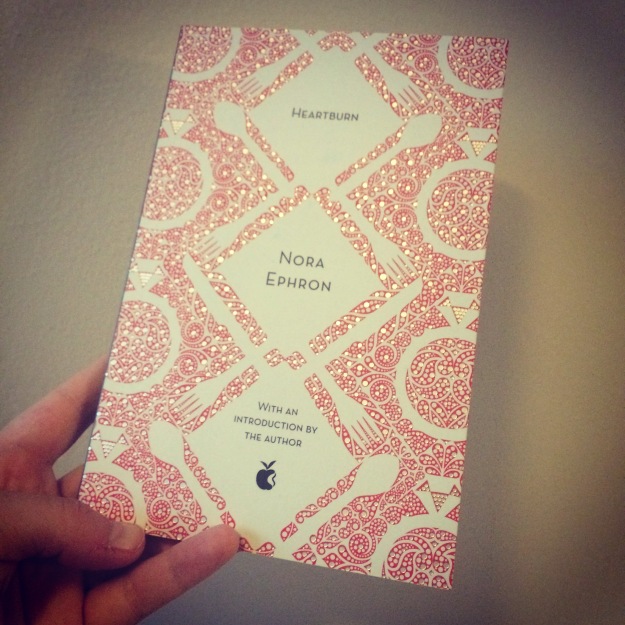

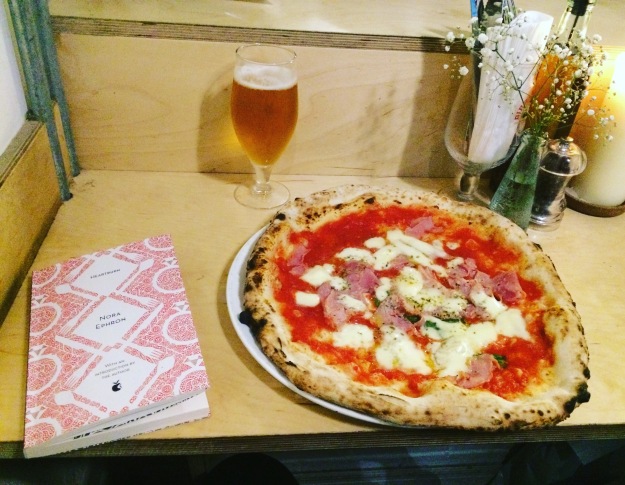


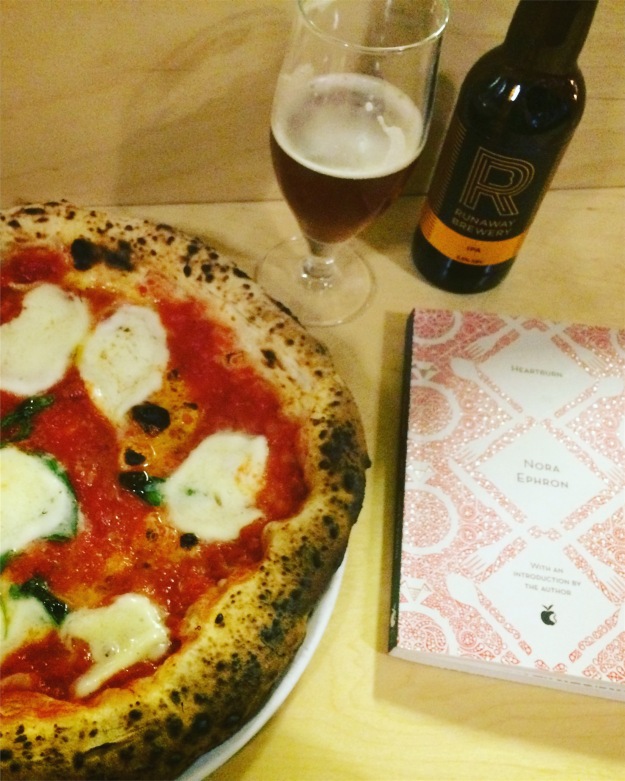
I didn’t read as much in 2018 as I did in 2017 but I’m still happy with reading just over a book a week.
55! I’m happy with that. 18 non fiction and 37 fiction.

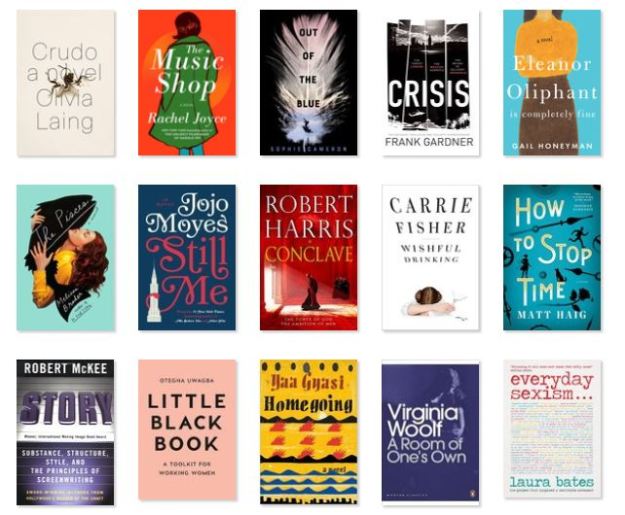
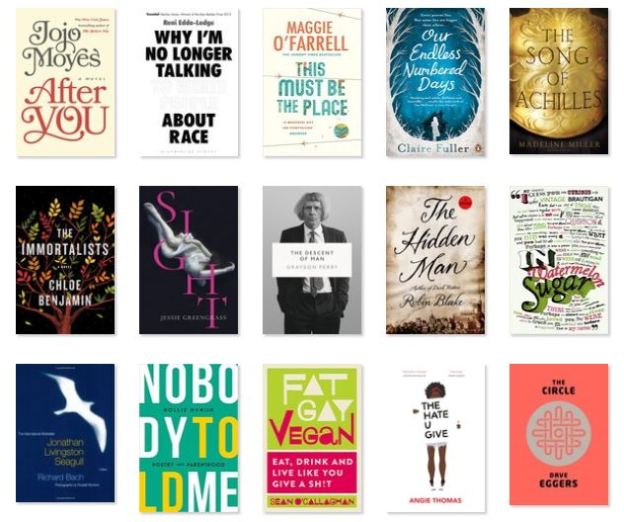

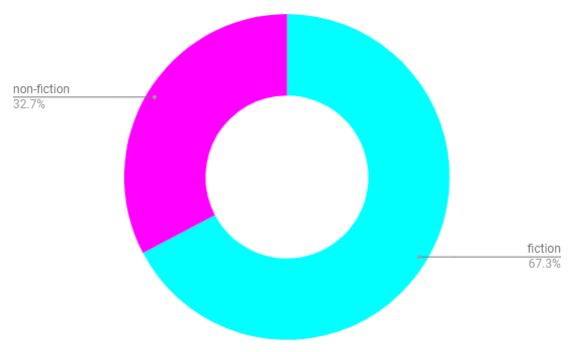
I would be happier with more non fiction, but the balance is ok for this one.
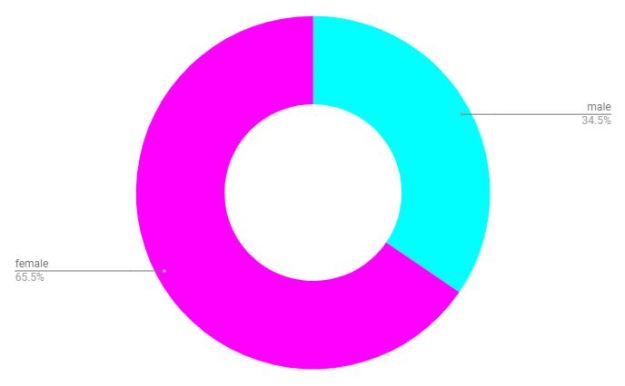
For the second year in a row, I have read about 2/3 female authors to male. This pleases me, though I would be happy with it going nearer to 50/50.
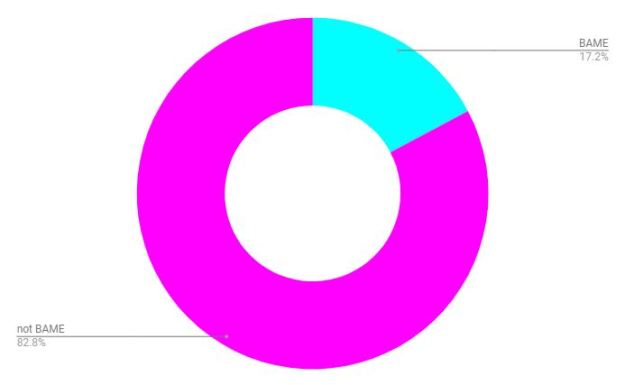
This is pathetic from me. I need to consciously sort this out and read more diversely.
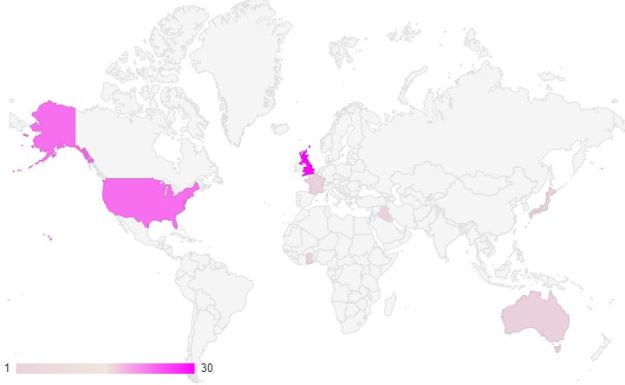
This is also not that great. Heavily weighted to US and British authors. I would like to read more stories from people around the world. I’l endeavour to do this.
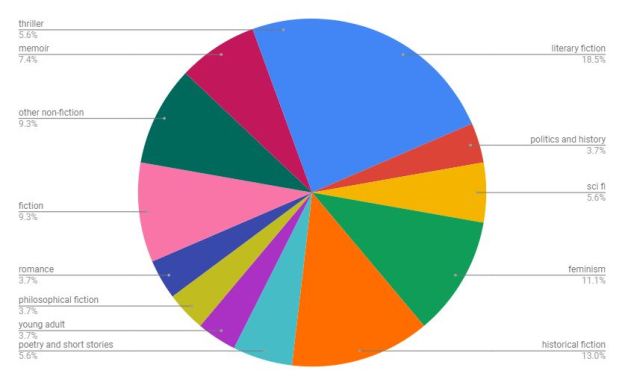
Some surprises in here. One is that I barely read any science books this year. Historical fiction had a boost, as did plain normal fiction.
Ok, four of my top ten are posts I wrote in 2017! I’m just gonna go with it. The stats don’t lie! Click the blog post title to go to the post.

1. Review of Rebellion Punk Festival 2017. I know, I know, it’s nothing to do with books. I very occasionally write about music. This one just seemed to hit a nerve!

2. Reservoir 13 – Jon McGregor. Oh dear… the book I really didn’t like. I don’t really go in for scathing reviews, but this book didn’t just not interest me, it actively annoyed me. I didn’t hold back with this review because it’s a hugely popular author and the book was widely loved. I felt my little opinion could be honest for this one.

3. My Top Non-Fiction Reads of 2018. Ahh this is quite nice because I only wrote it the other day!

4. Eleanor Oliphant is Completely Fine – Gail Honeyman. No surprises with this one – it has been hugely popular this year.

5. The Power – Naomi Alderman. Another 2017 post. The Power is an excellent book and quite rightly it should be one of my most viewed posts!

6. 20 Books of Summer Challenge 2018. I didn’t do so well on this challenge in 2018. I only managed 13 books – though I did read 2/3 of The Iliad. I finished 1 book in the entire of August – oh dear.

7. Ad Astra: An Illustrated Guide to Leaving the Planet – Dallas Campbell. I only read this last December, so it’s not really surprising it’s made it onto this years top ten posts. It’s an excellent book about space!

8. Motherhood – Helen Simpson. A beautiful collection of 5 short stories on motherhood.

9. My Top Fiction Reads of 2018. Really happy this has made it into the top ten. My ten favourite fiction reads of the year.

10. Jonathan Livingston Seagull – Richard Bach. Gosh you all love reading about when I don’t really like a book!
Finally, here’s all the books I read this year. Click the name of the book to go to my review:
I’m used to Sedaris’ books making me cry, always with laughter before this one. Now I can add tears because of how heartbreaking some of the stories are in Calypso. Here, Sedaris has hilarious stories mixed in with tragedy, most notably when talking about his sister, Tiffany’s, suicide, but they also cover relatives becoming elderly, and the death of his mother, who was an alcoholic.
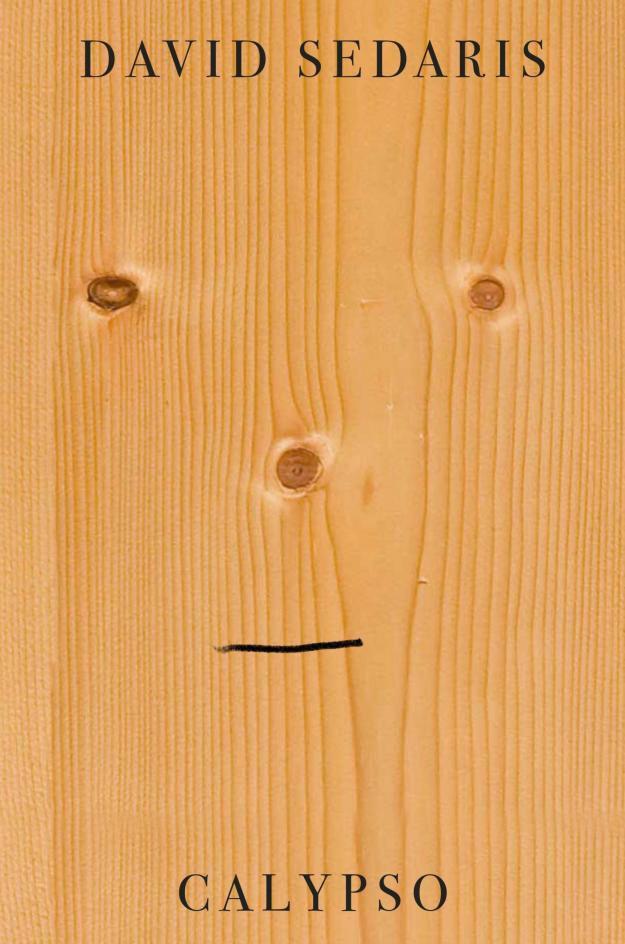
A lot of the stories in Calypso are about family. His father is ageing, his sister has committed suicide, he reminisces about his mother’s death, but this is not a depressing book. Of course it isn’t, Sedaris is hilarious. Most of these more sombre subjects are still dealt dark humour.
I found myself laughing out loud at some of this book – particularly the stories to do with language and observations about strangers and their behaviour. His discussion of creating his own ‘English for business travellers’ is a highlight.
Additionally, parts of Calypso were very moving. His sister’s suicide is so tragic. But he also talks emotionally about the US allowing gay marriage at last. Calypso is a true emotional roller coaster, and you get the feeling you are actually seeing some of the real Sedaris – mostly missing from his other books I’ve read.
It still leaves so many questions though. Did Sedaris really let someone who came to a book signing cut out a benign tumour he had, in order that he could keep it and feed it to his favourite turtle? Did he??
You go on an adventure of emotions with Sedaris, and you come out the other side with a renewed sense of wanting to make life more interesting. He makes you want to explore opportunities and to make the most of what presents itself to you. And he will make you laugh, that’s for sure.
For the purposes of my yearly wrap ups I go Dec 2017 to Nov 2018, because I can’t accept that I might not finish more amazing books over the next week. That means I read 15 non fiction books this year. I think I could have done better, but never mind! I read 22 last year, but I’ve read less over all this year in general. Last year I split them into politics and feminism, biography and memoir, and science – but I don’t have enough books to do separate ones this year, so they are all getting put together!
So here are my top non fiction reads from this year:

Why I’m No Longer Talking to White People About Race – Reni Eddo-Lodge
I’ve been recommending this book to everyone since I read it, and I was so happy that my book club chose it for their December read. It’s about race relations in Britain. It covers many different aspects from education, feminism, and black history. This would be my top book of the whole year. My review is here.

On Tyranny: Twenty Lessons From the Twentieth Century – Timothy Snyder
Twenty practical things you can do in your life to help combat the rise of tyranny. Each one backed up by twentieth century history. Brilliant and made me feel less useless in the face of what seems like the world imploding around us. My review is here.

The Descent of Man – Grayson Perry
Masculinity, what’s wrong with it, and how ideas about it should change to be healthier for everyone! It’s also very funny. My review is here.

Nobody Told Me: Poetry and Parenthood – Hollie McNish
Poems about pregnancy and motherhood, with McNish telling her story from finding out she was pregnant, up to her daughter being about three years old. So honest and brutal, yet full of love. My review is here.

The Mother of All Questions: Further Feminisms – Rebecca Solnit
A follow up to Men Explain Things To Me, Solnit covers all things feminism that aren’t already covered in Men Explain. It’s no exaggeration to say I found the title essay life affirming. I would really highly recommend this book, but read Men Explain first if you haven’t already read that. My review of The Mother of All Questions is here, and my review of Men Explain Things to Me is here!

A Room of One’s Own – Virginia Woolf
Virginia Woolf addressed a women’s college 1928 and talks about women and writing fiction. This extended essay is based on those talks. My review is here.

Story: Substance, Structure, Style, and the Principles of Screenwriting – Robert McKee
An unexpected top book entry here! I never expected that a book about screen writing would be that interesting to me, but I found this analysis of what makes a good story fascinating. There’s a huge list of films at the back too, and I love a list to work through. My review is here.

Wishful Drinking – Carrie Fisher
Fisher’s story of her life. She is hilarious. And her life has been bonkers. My review is here.

I’m a Joke and So Are You: A Comedian’s Take on What Makes up Human – Robin Ince
About brains, and the strange things they do. Really interesting read and funny, of course! My review is here.
Honourable mention to Ad Astra by Dallas Campbell. It would have made the top list, but it was covered by my list from last year (read it here) before I decided to make my year go Nov to Dec!

Here are all the non-fiction books I read this year. Click the book title to go to my review of it:
Slayers & Vampires: The Complete Uncensored, Unauthorised Oral History of Buffy & Angel – Edward Gross, Mark A. Altman
Story: Substance, Structure, Style, and the Principles of Screenwriting – Robert McKee
A guy who doesn’t care for conforming to societal norms ends up in a terrible situation, but ultimately doesn’t give a shit, because what’s the point, right? I sort of loved The Outsider for it’s weirdness and the protagonists attitude. Honestly, who doesn’t love a book categorised as philosophical fiction?
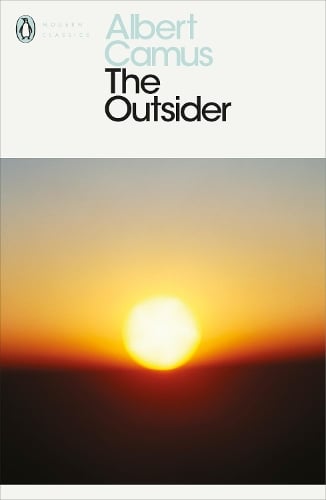
Meursault is our main character. His mother dies at the beginning of the book and he refuses to show emotions just to satisfy other peoples expectations. Ultimately this is brought back to him as one of the main pieces of evidence against him at his trial. He refuses to pretend and stays true to himself and is baffled as to why this seems to wind people up so much. He is tried for a terrible crime he commits, but also for not conforming.
Camus intended the book to highlight the absurdity of life. It’s also known as The Stranger, as it was was written in French as L’Étranger. Camus wrote, in 1955:
I summarised The Stranger a long time ago, with a remark I admit was highly paradoxical: ‘In our society any man who does not weep at his mother’s funeral runs the risk of being sentenced to death.’ I only meant that the hero of my book is condemned because he does not play the game.
I really enjoyed The Outsider. As well as looking at absurdity, it is an existentialist novel. Mersault often ponders death and ultimately decides he doesn’t care if it happens today or in twenty years. It’s going to happen at some point, so who cares when?
Despite being written in 1942, I found Mersualt’s thoughts when his girlfriend stops visiting him strangely reminiscent of my thoughts when that most grim and tedious of modern phenomena happens: ghosting.
For the first time in a very long while, I thought about Marie. She had stopped writing to me a long time ago. That evening, I considered the situation and decided she had perhaps grown tired of being the mistress of a man condemned to death. It also occurred to me that she might be sick or dead.
At times like this I try to remember this very good advice.
Yes, I know. I read one of the most important philosophical books of the twentieth century and I managed to make it all about the emotionally simple men I’ve cavorted with. Help me. Also, pls tattoo that advice on my eyeballs.
Do read The Outsider though. It’s a good, thoughtful read.

Set over five days in November 1920, Wake follows the lives of 3 women in the aftermath of the First World War, in the run up to the burial of the Unknown Warrior at Westminster Abbey. It focuses on the effect of the war on the women left behind, and the general disruption to society in the years afterwards.
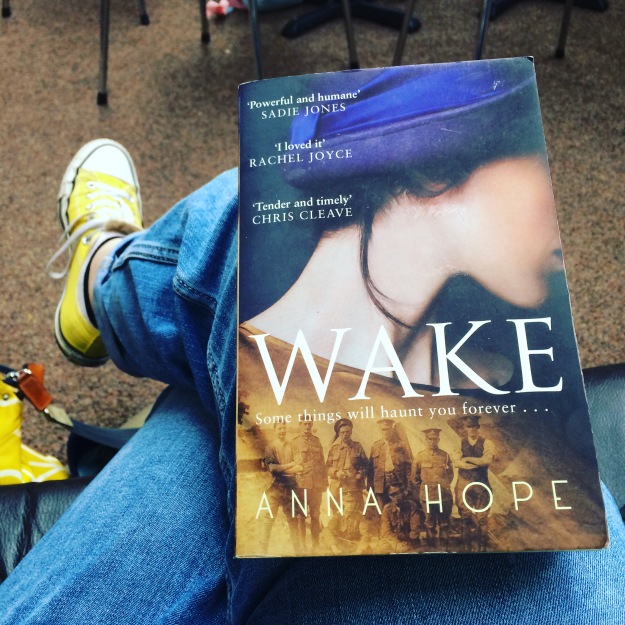
Wake manages to get across the feeling of collective grief felt by society after the war, and the dreadful situations many people found themselves in, particularly the poor soldiers who were traumatised, then abandoned by the government shortly after they returned home.
The chapters are interspersed with the story of the Unknown Warrior: the finding of a suitable body, the process of transporting it from France, and finally the burial. I liked how this linked the different stories, with it being the big news of the day, all the characters discuss it.
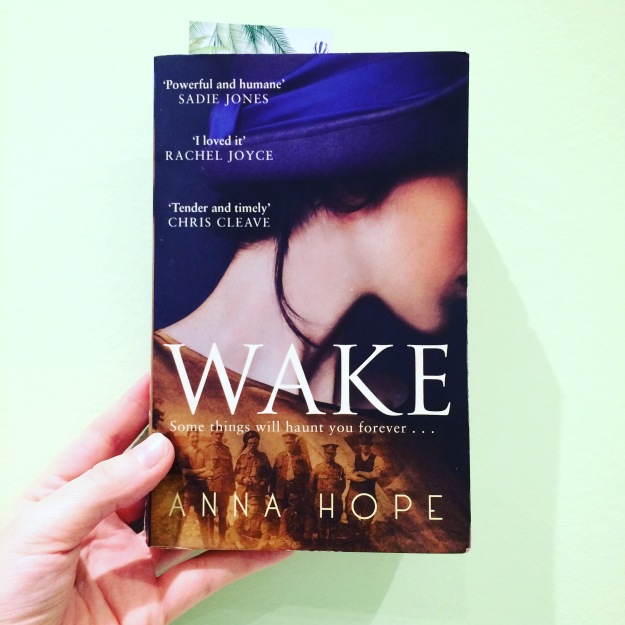
The three main stories in the book are about Hettie, a dancer at the Hammersmith Palais, whose brother has returned from the war a broken man. Evelyn, who lost her lover during the war and is now living a very grey existence without him. Finally, Ada whose son is missing, presumably dead, but she never received an official letter about him.
The stories of these women mean that a large cross section of the whole society are covered by the story. Different age groups and classes are all involved, and all are broken by the war in different ways.
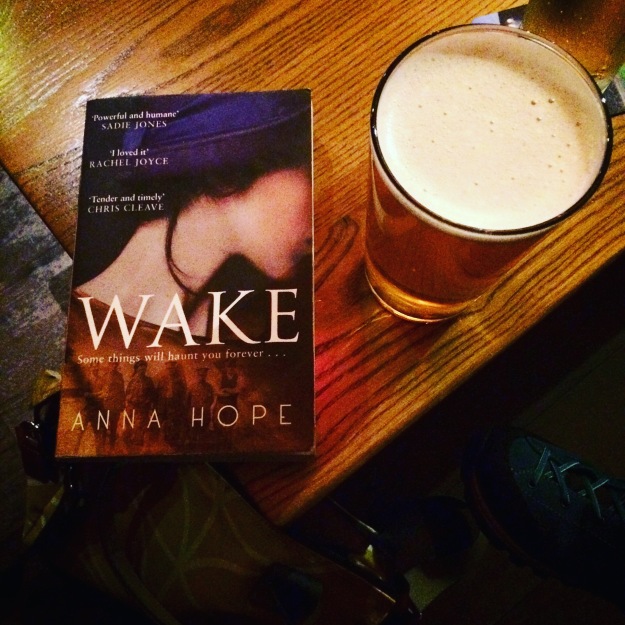
Wake was chosen by my book club as we would be meeting near Remembrance Day. I really enjoyed in and was particularly glad to not have to read a book about how grim life in the trenches was. It was nice to read about how grim life in the UK could be after the war. 😀
The burial of the Unknown Warrior gives a potentially depressing book a more hopeful ending as it signifies the start of a collective healing for society and for some of our main characters. I really enjoyed Wake and would definitely recommend it.
Convenience Store Woman is a really strange story of Keiko Furukura and her life working at a convenience store. She’s an odd character and the job suits her because there’s a manual telling her how to behave and interact with customers.
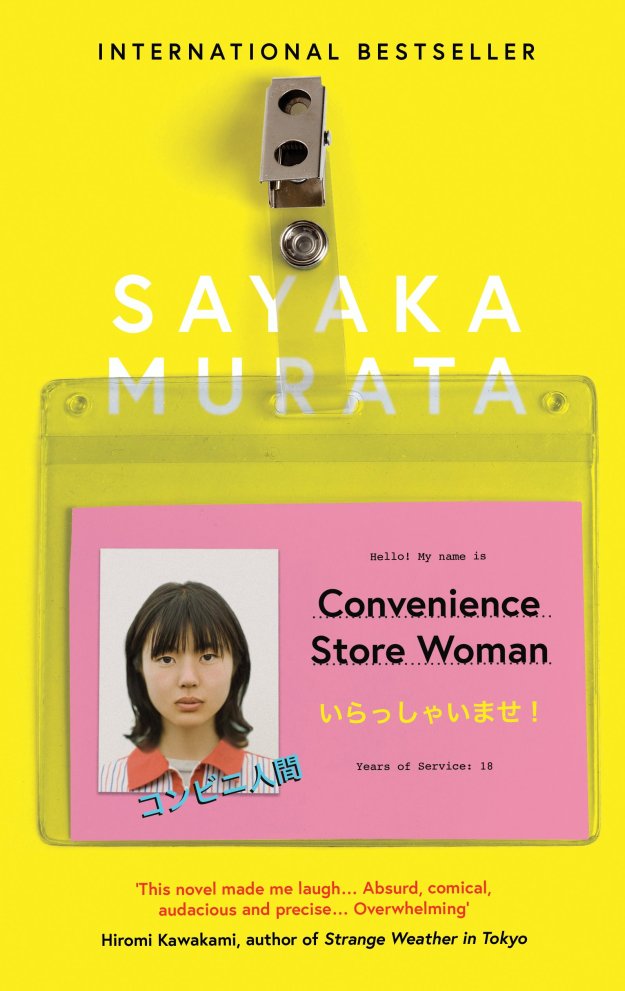
Keiko has been waiting her whole life for someone to just tell her how to behave with other people, because she has no clue herself. She seems to be devoid of any empathy. As a child, Keiko, has a few violent episodes where she is reacting to something very literally, and she has no idea why everyone is upset with her. Motivated by not wanting to upset her parents, she withdraws and asks her sister for advice on occasions when she wants to appear normal.
Finding the job at the convenience store is life changing for her because of the beloved manual.
“We’ve got quite similar tastes, haven’t we? I like your bag too,” Mrs. Izumi said with a smile. It’s only natural that my tastes would match hers since I’m copying her.
Things go well for Keiko for the next eighteen years, until she is getting so old that people start questioning her life. Why is she not married? Why does she still basically work at Spar? Honestly, these conforming weirdos should just leave her alone. Quite why other people are so concerned is beyond me. Most of the story is Keiko trying to deflect this negative attention from her and keep the appearance of normality.
The normal world has no room for exceptions and always quietly eliminates foreign objects. Anyone who is lacking is disposed of.
So that’s why I need to be cured. Unless I’m cured, normal people will expurgate me.
Finally I finally understood why my family had tried so hard to fix me.
Overall, I finished Convenience Store Woman and just didn’t really know how I felt about it! I enjoyed reading it, but it left me feeling quite disturbed. As though Keiko’s story is not really finished and something very, very sinister is lurking just around the corner for her… There’s one scene in the book that really hinted at this, and made me think the whole tone of the book was going to change, but it didn’t. Chilling!
Maybe I didn’t feel like I enjoyed it so much because I identified with Keiko in maybe too many ways. I’m quite socially awkward and also don’t like to do things just because society expects me to. I don’t have the no empathy thing though. Phew.

Overall I DID enjoy Convenience Store Woman, but it made me uncomfortable. This means it really evoked an emotional response and that’s generally what I want from a book. It’s just normally happiness or sadness! I haven’t been able to sit and write this review because I just couldn’t make my mind up about it! I finished it a month ago!
A lot of Convenience Store Woman is also really wry, and well observed, and funny. Keiko watching and commenting on other people is often funny and often very dark.
Now, however, it felt like he’d downgraded me from store worker to female of the human species.
Oh Keiko, we all get that. Urghhh.
Have you read Convenience Store Woman? What did you think?
I was always going to read a book by Robin Ince because I’m a fan of the things he does, and happily, I’m a Joke is a great book.
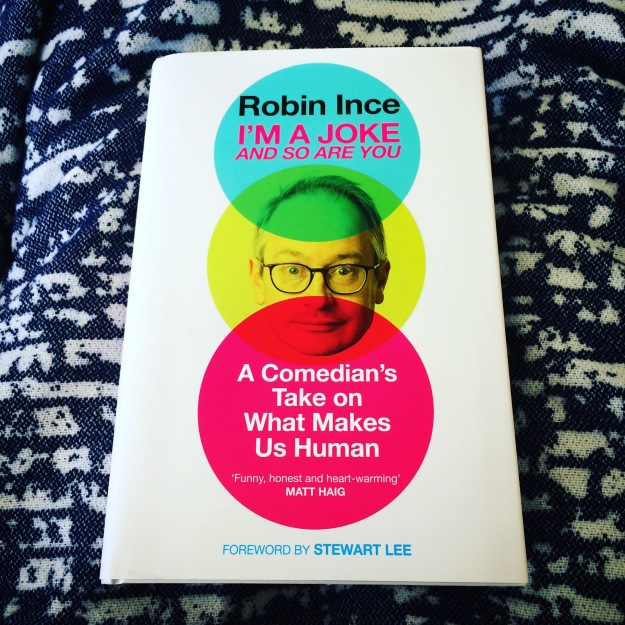
What is the book about? Rather than try and describe it myself, let’s have a look at the back of the book:
What better way to understand ourselves than through the eyes of comedians – those who professionally examine our quirks on stage daily? In this touching and witty book, award-winning presenter and comic Robin Ince uses the life of the stand-up as a way of exploring some of the biggest questions we all face. Where does anxiety come from? How do we overcome imposter syndrome? What is the key to creativity? How can we deal with grief?
Informed by personal insights from Robin as well as interviews with some of the world’s top comedians, neuroscientists and psychologists, this is a hilarious and often moving primer to the mind. But it is also a powerful call to embrace the full breadth of our inner experience – no matter how strange we worry it may be!
It’s a really enjoyable, easy to understand, interesting read about brains and the stuff they make you think.
If you find yourself thinking: I believe this writer is trying to engender a sense of ‘pity me’, then I am probably attempting to say, I was an idiot or I am an idiot or I will be an idiot again.
This is from quite near the beginning of I’m a Joke, and it just says to me that I will get along with this book.

I really enjoyed the chapter on voices you hear in your head and intrusive thoughts. It’s all interesting, and often funny too. He investigates day dreaming, the impact of events in your childhood on your adult brain, the idea of there being a ‘real you’, anxiety, and err…. death.
If anyone questions the sanity of your actions , just say it is art.
The interviews with different comedians and with scientist are a great addition to the text and give it a great balance between sciencey facts, and funny anecdotes. Probably worth reading just to hear Robin talk about his stage cardigan.
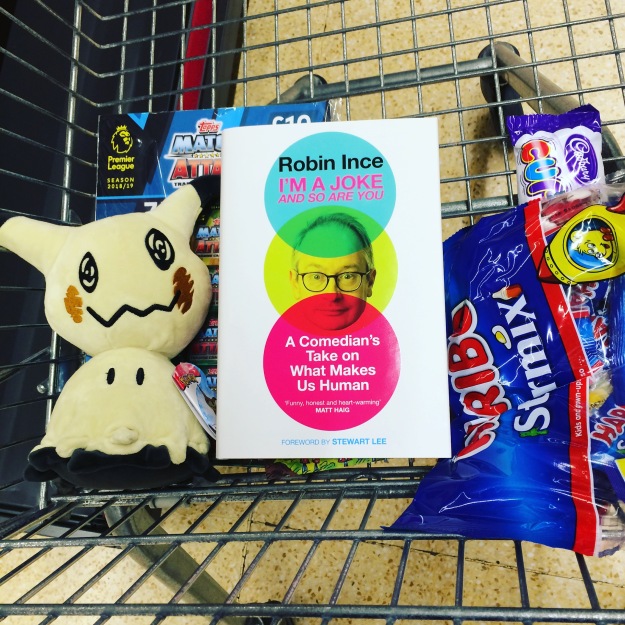
supermarket bargains
If you haven’t already been to see Robin Ince’s stand up I would also recommend that. He is also part of my all time favourite podcast, with Josie Long: Bookshambles. Here they talk with guests about books. It’s where I get a lot of my recommendations from! Of course, if you are a science fan, you should also listen to The Infinite Monkey Cage with Ince and Brian Cox and guests.
The Mother of All Questions is Solnit’s follow up to the amazing Men Explain Things to Me (my review of this can be found here). Firstly, if you haven’t read Men Explain Things to Me, please rectify this immediately. It is a brilliant book that sets out all the basics of feminism and why it’s so bloody necessary in the modern world. It makes arguments that I wish I could always remember. It is brilliant.
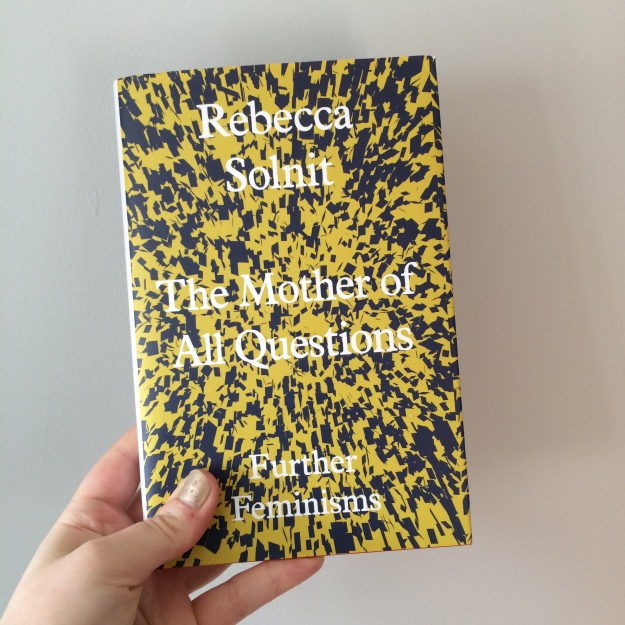
I *really* dislike the cover
The Mother of All Questions, as the follow up, is also excellent. But it doesn’t cover the same ground as Men Explain Things to Me. It’s more of a what has happened since that was published (2014), with some new ground covered. If I was to recommend only one of them to you, I would say read Men Explain, but really read both!
So what is covered in The Mother of All Questions? The format is essays on different subjects, I should probably have mentioned that first. Some of which have appeared in other places previously. The longest essay is about ways in which women are silenced. It opens with the title essay: about families and motherhood. There are also essays on the cultural change that seemed to happen around feminism in 2014, men and feminism, gun violence and misogyny, the recent history of the rape joke, and a few other short essays on various pop culture topics at the end of the book.
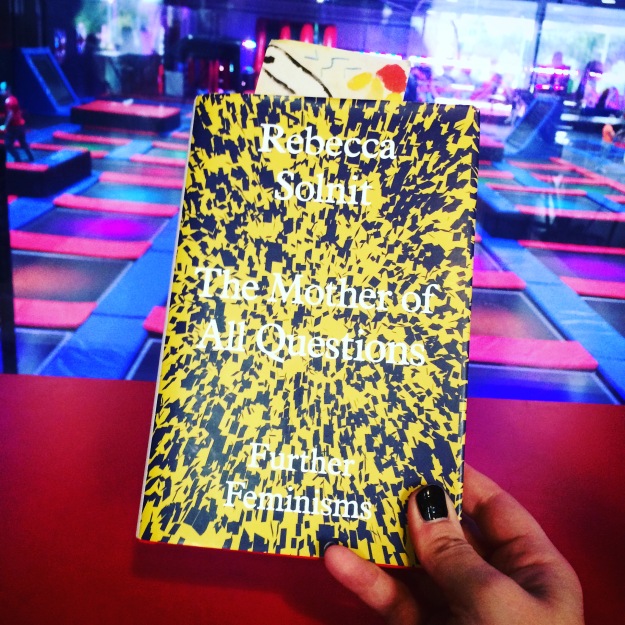
My favourite essay was The Mother of All Questions. It is no exaggeration to say that I found this essay to be life changing, or at the least to entirely give me confidence with some hard decisions I made at the end of last year. It was life-affirming for me. Solnit discusses attitudes to motherhood and her own experience of how people treat her as a childless woman.
She begins by telling a story about a talk she gave on Virginia Woolf. A lot of audience questions were about Woolf’s childlessness.
What I should have said to that crowd was that our interrogation of Woolf’s reproductive status was a soporific and pointless detour from the magnificent questions her work poses. (I think at some point I said, “Fuck this shit,” which carried the same general message, and moved everyone on from the discussion.)

In the long essay on silence, I underlined a few key points. They are firstly a clarification between silence and quiet:
for the purposes of this essay, regard silence as what is imposed and quiet as what is sought.
I like that and I’ll remember this difference. I don’t really think its something I’ve thought about before.
Being unable to tell your story is a living death and sometimes a literal one.
and
What we call politeness often means training that other people’s comfort matters more.
We could all do with remembering that every now and then. Finally:
Being a woman is a perpetual state of wrongness, as far as I can determine. Or, rather, it is under patriarchy.
This essay takes up 50 pages of the book, and the whole thing is less than 200 pages altogether. It a wide ranging essay and is well worth a read. Some of it is reminiscent of Mary Beard’s Women and Power (my review here) and Beard’s lectures that Women and Power are based on, are discussed in Solnit’s essay.
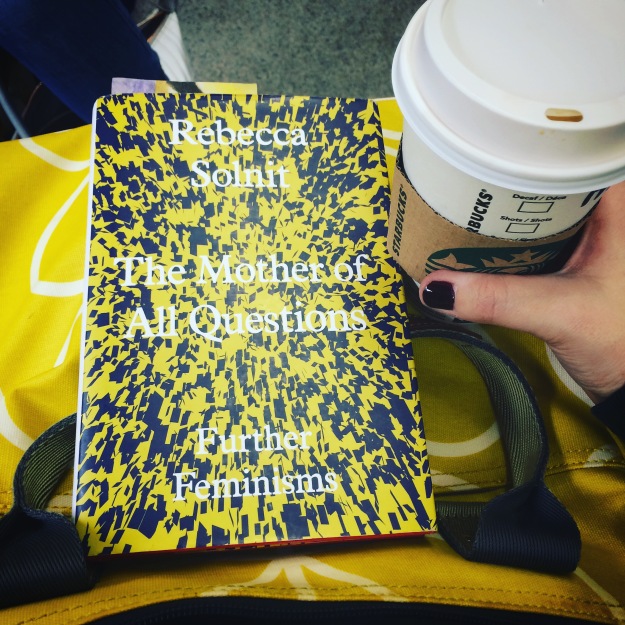
I love Solnit’s writing, so I was always going to love this book. It doesn’t disappoint.